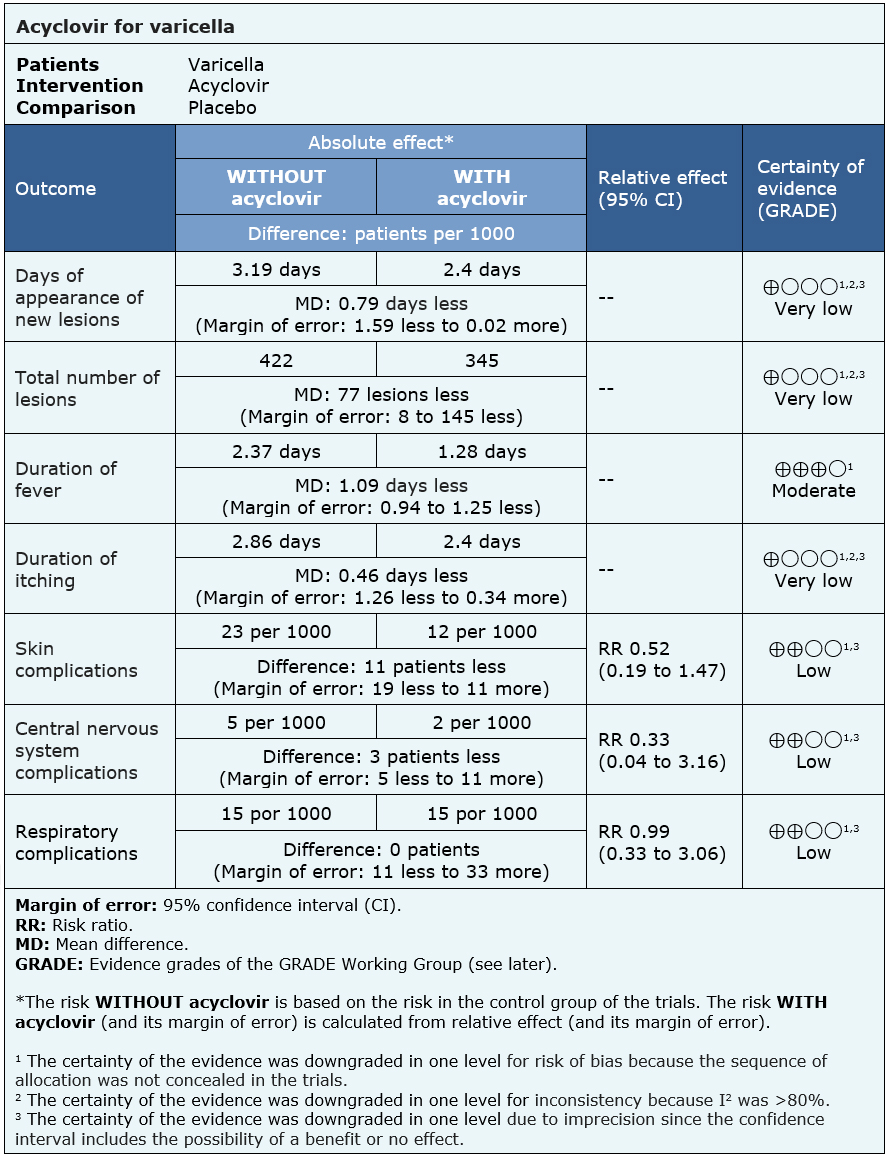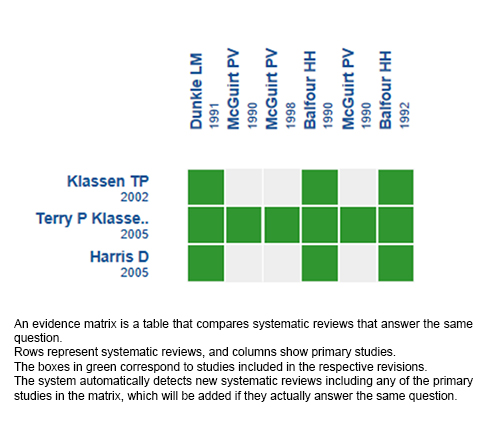
 Para Descargar PDF debe Abrir sesión.
Para Descargar PDF debe Abrir sesión.
Palabras clave: Acyclovir, varicella, Epistemonikos, GRADE.
INTRODUCTION
Varicella (chickenpox) is a frequent and highly contagious infectious disease, caused by the Varicella zoster virus. Traditionally, it has been recommended to focus on the management of symptoms, since there is controversy about the role of antivirals, particularly in children and adolescents.
METHODS
To answer this question we used Epistemonikos, the largest database of systematic reviews in health, which is maintained by screening multiple information sources, including MEDLINE, EMBASE, Cochrane, among others. We extracted data from the systematic reviews, reanalyzed data of primary studies, conducted a meta-analysis and generated a summary of findings table using the GRADE approach.
RESULTS AND CONCLUSIONS
We identified three systematic reviews including three studies overall, all of them corresponding to randomized trials. We concluded the use of acyclovir might not decrease the associated complications, and it is not clear whether it reduces lesions or itching because the certainty of the evidence is very low.
Varicella is an infectious disease caused by the Varicella zoster virus. Most cases occur before the age of fourteen, determining school absenteeism and generating significant expenses.Traditionally, the management of this condition relies on symptomatic treatment only. However, 5 to 10% suffer skin, respiratory or central nervous system complications.
Acyclovir is an antiviral of virostatic action with a structure analogous to guanosine, which acts by inhibiting replication of Varicella zoster virus. However, its actual efficacy for the treatment of varicella remains unclear.
To answer the question, we used Epistemonikos, the largest database of systematic reviews in health, which is maintained by screening multiple information sources, including MEDLINE, EMBASE, Cochrane, among others, to identify systematic reviews and their included primary studies. We extracted data from the identified reviews and reanalyzed data from primary studies included in those reviews. With this information, we generated a structured summary denominated FRISBEE (Friendly Summary of Body of Evidence using Epistemonikos) using a pre-established format, which includes key messages, a summary of the body of evidence (presented as an evidence matrix in Epistemonikos), meta-analysis of the total of studies when it is possible, a summary of findings table following the GRADE approach and a section of other considerations for decision-making.
|
Key messages
|
|
What is the evidence. |
We found three systematic reviews [1],[2],[3] that included three primary studies [4],[5],[6], all corresponding to randomized trials. |
|
What types of patients were included* |
All trials considered only immunocompetent patients, with less than 24 hours from the beginning of symptoms. Two trials [4],[6] required laboratory confirmation, and one only a clinical diagnosis [5]. |
|
What types of interventions were included* |
All trials used acyclovir as an intervention and compared it against placebo. |
|
What types of outcomes |
The trials measured multiple outcomes, which were pooled by the identified systematic reviews as follows:
The follow-up was 28 days in two trials [5],[6] and up to 1 year in one trial [4]. |
* The information about primary studies is extracted from the systematic reviews identified, unless otherwise specified.
The information on the effects of acyclovir is based on three randomized trials including 988 patients.
All trials reported time of appearance of new lesions, total number of lesions, and time until resolution of fever and skin complications (988 patients). Two trials [4],[5] also measured time to resolution of pruritus, and central nervous system and respiratory complications (826 patients).
The summary of findings is as follows:

| Following the link to access the interactive version of this table (Interactive Summary of Findings – iSoF) |

|
To whom this evidence does and does not apply |
|
| About the outcomes included in this summary |
|
| Balance between benefits and risks, and certainty of the evidence |
|
| Resource considerations |
|
| What would patients and their doctors think about this intervention |
|
|
Differences between this summary and other sources |
|
| Could this evidence change in the future? |
|
Using automated and collaborative means, we compiled all the relevant evidence for the question of interest and we present it as a matrix of evidence.

Follow the link to access the interactive version: Acyclovir for varicella.
The upper portion of the matrix of evidence will display a warning of “new evidence” if new systematic reviews are published after the publication of this summary. Even though the project considers the periodical update of these summaries, users are invited to comment in Medwave or to contact the authors through email if they find new evidence and the summary should be updated earlier.
After creating an account in Epistemonikos, users will be able to save the matrixes and to receive automated notifications any time new evidence potentially relevant for the question appears.
This article is part of the Epistemonikos Evidence Synthesis project. It is elaborated with a pre-established methodology, following rigorous methodological standards and internal peer review process. Each of these articles corresponds to a summary, denominated FRISBEE (Friendly Summary of Body of Evidence using Epistemonikos), whose main objective is to synthesize the body of evidence for a specific question, with a friendly format to clinical professionals. Its main resources are based on the evidence matrix of Epistemonikos and analysis of results using GRADE methodology. Further details of the methods for developing this FRISBEE are described here (http://dx.doi.org/10.5867/medwave.2014.06.5997)
Epistemonikos foundation is a non-for-profit organization aiming to bring information closer to health decision-makers with technology. Its main development is Epistemonikos database (www.epistemonikos.org).
Potential conflicts of interest
The authors do not have relevant interests to declare.
 Esta obra de Medwave está bajo una licencia Creative Commons Atribución-NoComercial 3.0 Unported. Esta licencia permite el uso, distribución y reproducción del artículo en cualquier medio, siempre y cuando se otorgue el crédito correspondiente al autor del artículo y al medio en que se publica, en este caso, Medwave.
Esta obra de Medwave está bajo una licencia Creative Commons Atribución-NoComercial 3.0 Unported. Esta licencia permite el uso, distribución y reproducción del artículo en cualquier medio, siempre y cuando se otorgue el crédito correspondiente al autor del artículo y al medio en que se publica, en este caso, Medwave.

INTRODUCTION
Varicella (chickenpox) is a frequent and highly contagious infectious disease, caused by the Varicella zoster virus. Traditionally, it has been recommended to focus on the management of symptoms, since there is controversy about the role of antivirals, particularly in children and adolescents.
METHODS
To answer this question we used Epistemonikos, the largest database of systematic reviews in health, which is maintained by screening multiple information sources, including MEDLINE, EMBASE, Cochrane, among others. We extracted data from the systematic reviews, reanalyzed data of primary studies, conducted a meta-analysis and generated a summary of findings table using the GRADE approach.
RESULTS AND CONCLUSIONS
We identified three systematic reviews including three studies overall, all of them corresponding to randomized trials. We concluded the use of acyclovir might not decrease the associated complications, and it is not clear whether it reduces lesions or itching because the certainty of the evidence is very low.
 Autores:
Felipe González[1,2], Pamela Rojas[2,3]
Autores:
Felipe González[1,2], Pamela Rojas[2,3]

Citación: González F, Rojas P. Is acyclovir effective for the treatment of varicella in children and adolescents?. Medwave 2018;18(6):e7268 doi: 10.5867/medwave.2018.06.7268
Fecha de envío: 21/6/2018
Fecha de aceptación: 29/8/2018
Fecha de publicación: 4/10/2018
Origen: Este artículo es producto del Epistemonikos Evidence Synthesis Project de la Fundación Epistemonikos, en colaboración con Medwave para su publicación.
Tipo de revisión: Con revisión por pares sin ciego por parte del equipo metodológico del Epistemonikos Evidence Synthesis Project.

Nos complace que usted tenga interés en comentar uno de nuestros artículos. Su comentario será publicado inmediatamente. No obstante, Medwave se reserva el derecho a eliminarlo posteriormente si la dirección editorial considera que su comentario es: ofensivo en algún sentido, irrelevante, trivial, contiene errores de lenguaje, contiene arengas políticas, obedece a fines comerciales, contiene datos de alguna persona en particular, o sugiere cambios en el manejo de pacientes que no hayan sido publicados previamente en alguna revista con revisión por pares.
Aún no hay comentarios en este artículo.
Para comentar debe iniciar sesión
 Medwave publica las vistas HTML y descargas PDF por artículo, junto con otras métricas de redes sociales.
Medwave publica las vistas HTML y descargas PDF por artículo, junto con otras métricas de redes sociales.
 Klassen TP, Belseck EM, Wiebe N, Hartling L. Acyclovir for treating varicella
in otherwise healthy children and adolescents: a systematic review of randomised
controlled trials. BMC Pediatr. 2002 Sep 30;2:9.
| PubMed | PMC |
Klassen TP, Belseck EM, Wiebe N, Hartling L. Acyclovir for treating varicella
in otherwise healthy children and adolescents: a systematic review of randomised
controlled trials. BMC Pediatr. 2002 Sep 30;2:9.
| PubMed | PMC | Klassen TP, Hartling L, Wiebe N, Belseck EM. Acyclovir for treating varicella
in otherwise healthy children and adolescents. Cochrane Database Syst Rev. 2005
Oct 19;(4):CD002980.
| PubMed |
Klassen TP, Hartling L, Wiebe N, Belseck EM. Acyclovir for treating varicella
in otherwise healthy children and adolescents. Cochrane Database Syst Rev. 2005
Oct 19;(4):CD002980.
| PubMed | Harris D, Redhead J. Should acyclovir be prescribed for immunocompetent
children presenting with chickenpox? Arch Dis Child. 2005 Jun;90(6):648-50.
| PubMed | PMC |
Harris D, Redhead J. Should acyclovir be prescribed for immunocompetent
children presenting with chickenpox? Arch Dis Child. 2005 Jun;90(6):648-50.
| PubMed | PMC | Balfour HH Jr, Kelly JM, Suarez CS, Heussner RC, Englund JA, Crane DD, McGuirt
PV, Clemmer AF, Aeppli DM. Acyclovir treatment of varicella in otherwise healthy
children. J Pediatr. 1990 Apr;116(4):633-9.
| PubMed |
Balfour HH Jr, Kelly JM, Suarez CS, Heussner RC, Englund JA, Crane DD, McGuirt
PV, Clemmer AF, Aeppli DM. Acyclovir treatment of varicella in otherwise healthy
children. J Pediatr. 1990 Apr;116(4):633-9.
| PubMed | Dunkle LM, Arvin AM, Whitley RJ, Rotbart HA, Feder HM Jr, Feldman S, Gershon
AA, Levy ML, Hayden GF, McGuirt PV, et al. A controlled trial of acyclovir for
chickenpox in normal children. N Engl J Med. 1991 Nov 28;325(22):1539-44. | PubMed |
Dunkle LM, Arvin AM, Whitley RJ, Rotbart HA, Feder HM Jr, Feldman S, Gershon
AA, Levy ML, Hayden GF, McGuirt PV, et al. A controlled trial of acyclovir for
chickenpox in normal children. N Engl J Med. 1991 Nov 28;325(22):1539-44. | PubMed | Balfour HH Jr, Rotbart HA, Feldman S, Dunkle LM, Feder HM Jr, Prober CG,
Hayden GF, Steinberg S, Whitley RJ, Goldberg L, et al. Acyclovir treatment of
varicella in otherwise healthy adolescents. The Collaborative Acyclovir Varicella
Study Group. J Pediatr. 1992 Apr;120(4 Pt 1):627-33. | PubMed |
Balfour HH Jr, Rotbart HA, Feldman S, Dunkle LM, Feder HM Jr, Prober CG,
Hayden GF, Steinberg S, Whitley RJ, Goldberg L, et al. Acyclovir treatment of
varicella in otherwise healthy adolescents. The Collaborative Acyclovir Varicella
Study Group. J Pediatr. 1992 Apr;120(4 Pt 1):627-33. | PubMed | NHS Plus, Royal College of Physicians, Faculty of Occupational Medicine. Varicella zoster virus: occupational aspects of management. A national guideline. London: RCP, 2010.
NHS Plus, Royal College of Physicians, Faculty of Occupational Medicine. Varicella zoster virus: occupational aspects of management. A national guideline. London: RCP, 2010.